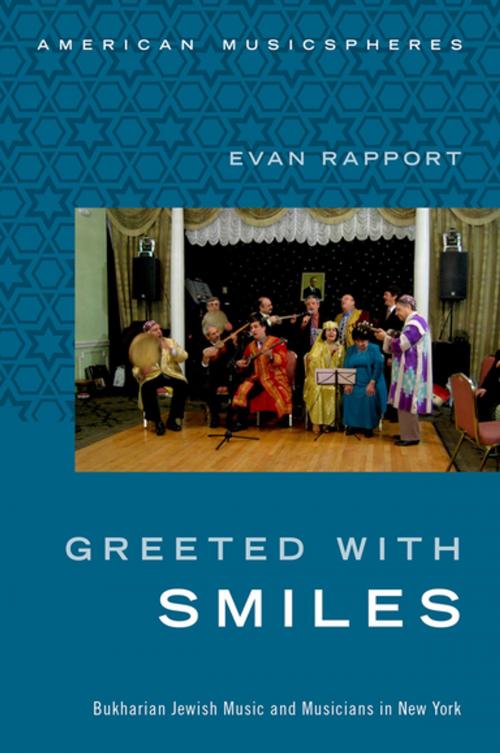Greeted With Smiles
Bukharian Jewish Music and Musicians in New York
Nonfiction, Entertainment, Music, Theory & Criticism, Ethnomusicology, International| Author: | Evan Rapport | ISBN: | 9780190226343 |
| Publisher: | Oxford University Press | Publication: | October 16, 2014 |
| Imprint: | Oxford University Press | Language: | English |
| Author: | Evan Rapport |
| ISBN: | 9780190226343 |
| Publisher: | Oxford University Press |
| Publication: | October 16, 2014 |
| Imprint: | Oxford University Press |
| Language: | English |
As the Soviet Union stood on the brink of collapse, thousands of Bukharian Jews left their homes from across the predominantly Muslim cities of Central Asia, to reestablish their lives in the United States, Israel and Europe. Today, about thirty thousand Bukharian Jews reside in New York City, settled into close-knit communities and existing as a quintessential American immigrant group. For Bukharian immigrants, music is an essential part of their communal self-definition, and musicians frequently act as cultural representatives for the group as a whole. Greeted with Smiles: Bukharian Jewish Music and Musicians in New York explores the circumstances facing new American immigrants, using the music of the Bukharian Jews to gain entrance into their community and their culture. Author Evan Rapport investigates the transformation of Bukharian identity through an examination of corresponding changes in its music, focusing on three of these distinct but overlapping repertoires - maqom (classical or "heavy" music), Jewish religious music and popular party (or "light") music. Drawing upon interviews, participant observation and music lessons, Rapport interprets the personal perspectives of musicians who serve as community leaders and representatives. By adapting strategies acquired as an ethno-religious minority among Central Asian Muslim neighbors, Bukharian musicians have adjusted their musical repertoire in their new American home. The result is the creation of a distinct Bukharian Jewish American identity-their musical activities are changing the city's cultural landscape while at the same time providing for an understanding of the cultural implications of Bukharian diaspora. Greeted with Smiles is sure to be an essential text for ethnomusicologists and scholars of Jewish and Central Asian music and culture, Jewish-Muslim interaction and diasporic communities.
As the Soviet Union stood on the brink of collapse, thousands of Bukharian Jews left their homes from across the predominantly Muslim cities of Central Asia, to reestablish their lives in the United States, Israel and Europe. Today, about thirty thousand Bukharian Jews reside in New York City, settled into close-knit communities and existing as a quintessential American immigrant group. For Bukharian immigrants, music is an essential part of their communal self-definition, and musicians frequently act as cultural representatives for the group as a whole. Greeted with Smiles: Bukharian Jewish Music and Musicians in New York explores the circumstances facing new American immigrants, using the music of the Bukharian Jews to gain entrance into their community and their culture. Author Evan Rapport investigates the transformation of Bukharian identity through an examination of corresponding changes in its music, focusing on three of these distinct but overlapping repertoires - maqom (classical or "heavy" music), Jewish religious music and popular party (or "light") music. Drawing upon interviews, participant observation and music lessons, Rapport interprets the personal perspectives of musicians who serve as community leaders and representatives. By adapting strategies acquired as an ethno-religious minority among Central Asian Muslim neighbors, Bukharian musicians have adjusted their musical repertoire in their new American home. The result is the creation of a distinct Bukharian Jewish American identity-their musical activities are changing the city's cultural landscape while at the same time providing for an understanding of the cultural implications of Bukharian diaspora. Greeted with Smiles is sure to be an essential text for ethnomusicologists and scholars of Jewish and Central Asian music and culture, Jewish-Muslim interaction and diasporic communities.















